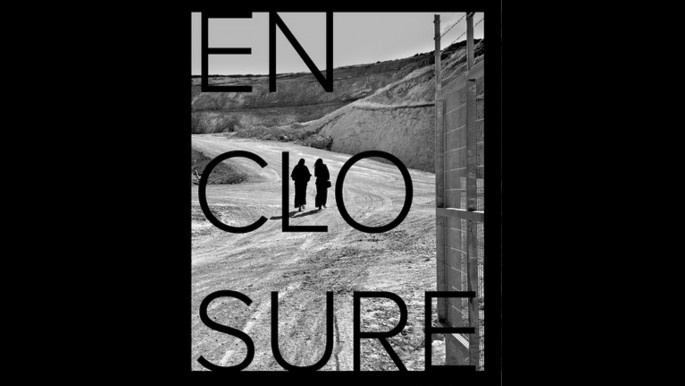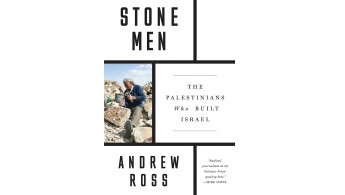Stone Men: The Palestinians Who Built Israel
Alongside the ongoing Palestinian anti-colonial struggle against Israeli colonisation, many Palestinians have been involved in the physical building of the settler-colonial state.
Andrew Ross's book, Stone Men: The Palestinians Who Built Israel, provides an in-depth assessment of the coercive and exploitative dynamics which have the potential to open new ways of looking at Palestinian rights to land and territory.
Based on research and interviews, Ross embarks upon detailed insights into early Zionist perceptions of Palestinians and labour, and how building Israel constitutes an ongoing violation of Palestinian rights which should allow Palestinians to build a case for claims.
Departing from the 1948 ethnic cleansing during the Nakba, Ross makes an observation that sets the premise for his book. He writes, "The physical unfolding of Zionism on the land has always been a project that both relied on Arab workers and was indebted to them in ways that have yet to be fully reckoned with."
The settler-colonial project required skilled workers to build its cities on stolen land, thus resulting in a multi-layered process of exploitation.
 |
The settler-colonial project required skilled workers to build its cities on stolen land, thus resulting in a multi-layered process of exploitation |  |
Palestinian limestone, Ross asserts, is considered as one of the best globally. To appropriate such stone and add its significance to the mythical narratives which Israel requires to sustain its presence was a priority.
Palestinian labourers, skilled in their trade, would bring an authentic touch to back Israel's myths, while leaving the real architects and builders invisible – stifled by a myriad of restrictions, violations and growing dependence due to the premeditated deprivation unleashed by Israel upon the Palestinian people.
Ross points out the dual face of dependence, while making it clear that while the Jewish settler-colonial population was dependent upon Palestinian skilled workers to build their cities, they were also in a position to afford and indeed capitalise upon their dependency.
 |
|
| Read more from The New Arab's Book Club: Enclosure: Palestinian Landscapes in a Historical Mirror |
By way of the colonial framework imposed by Israel, Palestinians were subjugated to a dependency that only became more entrenched through the decades, to the extent that, Ross points out, some Palestinians have also participated in the landmark illegalities that incarcerate Palestinians into apartheid – the wall being one such structure.
The book describes how, for Israelis, having Palestinians work at the Wall during construction served as a convenient human shield.
Meanwhile, the neoliberal policies enforced upon the Palestinian people also provided avenues for the Palestinian elite to capitalise upon joint ventures with Israel – the city of Rawabi is a case in point and which constitutes a form of land grab and exploitation in which the actors' motives were far from dependent.
As the book progresses, Ross shows how Palestinian workers who have had to contend with their own dilemmas, caught between anti-colonial struggle and necessary survival, were also stripped of benefits, safety conditions at work and exploited through the Palestinian Authority's designation of a minimum wage for labourers which walls below the poverty line in the occupied West Bank.
Throughout his interviews with Palestinian workers, Ross observes that "contempt for the PA ran almost as strong as the anti-Zionist sentiment."
Building Israel is visible yet anonymous. It is through Ross's interviews with Palestinians that the input is acknowledged.
Indeed, the book would have benefited from allocating more space for Palestinian voices to speak out. However, the snippets and anecdotes included in the book testify to the plight of a silenced population and the importance of looking at different interpretations of the Palestinian right of return.
In his introduction to the book, Ross ponders, "Should claims arising from this long record of labour participation be part of the 'final status' settlement between Israelis and Palestinians?" He further insists that Palestinian cumulative labour has earned Palestinians "civil and political rights."
 |
Israelis, Ross says, are not concerned with the underpinnings of how their cities were constructed and by whom, much less that they are intruders on stolen land |  |
Speaking with Palestinians, Ross's argument is validated. Among Palestinian labourers, there is no talk of a two-state paradigm, and a widespread acknowledgement that the negotiations have only resulted in further loss of land and rights. The one-state alternative from a Palestinian perspective is an assertion of never having given up the right of return since the 1948 Nakba.
As one Palestinian participant declared, "I've been building homes everyday over there for thirty years. In a way, it's really my country too, isn't it?"
Such realisation marks the cacophony Israel has created with its illegal colonial presence and which can only be solved by recognition and restitution of Palestinian rights over historic Palestine, including their right to return to their homeland.
Israelis, Ross says, are not concerned with the underpinnings of how their cities were constructed and by whom, much less that they are intruders on stolen land.
However, the absence of such consideration should not legitimise the colonial presence in Palestine. On the contrary, the Palestinians' role in creating Israel's physical presence out of extortion needs to garner more visibility in the wider anti-colonial struggle for land and people.
Ramona Wadi is an independent researcher, freelance journalist, book reviewer and blogger specialising in the struggle for memory in Chile and Palestine, colonial violence and the manipulation of international law.
Follow her on Twitter: @walzerscent




